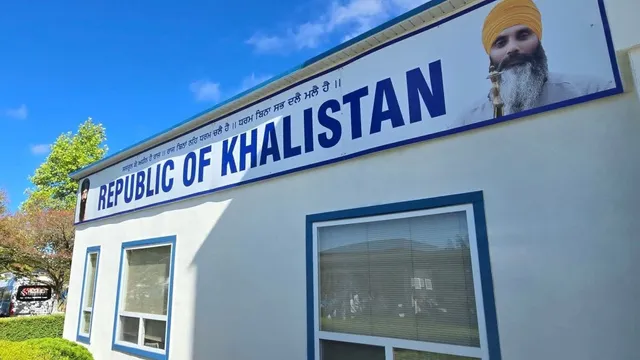- By Supratik Das
- Tue, 05 Aug 2025 01:08 PM (IST)
- Source:JND
A fresh controversy has revived tensions between India and Canada as a signboard that said "Republic of Khalistan" surfaced on the compound of the Guru Nanak Sikh Gurdwara in Surrey, British Columbia. The banner, allegedly put up by pro-Khalistan organization Sikhs for Justice (SFJ), calls the place the "Republic of Khalistan. The building where the signboard is situated is in a community center partially funded by the British Columbia Government, residents informed CNN-News18. They also alleged that the province recently provided USD 150,000 to upgrade infrastructure, such as the addition of an elevator.
Lmao
— Journalist V (@OnTheNewsBeat) August 5, 2025
Khalistanis have declared sovereign territory "Republic of Khalistan" in Surrey, BC at the Sikh Gurdwara
Canadian laws will no longer be enforced there (they weren't anyway) pic.twitter.com/fG3IsFFuez
This development comes at a sensitive time, just months after Canada’s new Prime Minister Mark Carney began efforts to mend ties with India following a deep freeze in diplomatic relations triggered by former PM Justin Trudeau’s allegations regarding Indian involvement in the 2023 killing of Sikh separatist Hardeep Singh Nijjar.
Khalistan Movement: A Diplomatic Flashpoint
Earlier this year, Canada's top intelligence agency, CSIS (Canadian Security Intelligence Service) reaffirmed in its 2025 annual report that Khalistani extremists from Canadian soil continue to promote and finance violence targeting India. "Khalistani extremists continue to make use of Canada as a base for the promotion, fundraising, or planning of violence mainly in India," the CSIS report stated, eliciting fresh diplomatic worries in New Delhi. India has long charged Canada with ignoring anti-India separatist movements thriving under the cover of freedom of expression. The 2025 CSIS report, however, represented the first official recognition by Canada of the magnitude and scale of such activities.
The Khalistan movement, which called for an independent Sikh homeland in India's Punjab, has been a core bane of India-Canada relations. Although for the most part subdued in India following a violent rebellion in the 1980s, the movement has continued overseas, notably in nations such as Canada, the UK, and Australia, where major Sikh diasporas exist. The violent past of the movement involves the 1985 Air India bombing, one of the most fatal terror attacks attributable to Canadian soil, with 329 fatalities. Both Babbar Khalsa International (BKI) and International Sikh Youth Federation (ISYF), suspected of being involved, were added to Canada's list of terrorist groups in 2003.
India-Canada Diplomatic Breakdown
The tensions grew exponentially in September 2023 when ex-PM Justin Trudeau accused India of orchestrating the murder of Hardeep Singh Nijjar, a Canadian citizen and supporter of Khalistan who was deemed a terrorist by India in 2020. Trudeau's assertion in Parliament that there was a "potential link" between Indian operatives and Nijjar's murder precipitated a tit-for-tat diplomatic expulsions, suspension of trade negotiations, and recall of 41 Canadian diplomats from India. Anti-India mood strengthened in Canada, with threats to Indian envoys, pro-Khalistan hoardings, and damage to Hindu temples. India retaliated by halting visa services and calling for non-interference in its affairs.
Following the nearly two-year diplomatic freeze, the situation improved with the election of Prime Minister Mark Carney. In June 2025, Carney made a symbolic gesture by inviting Indian Prime Minister Narendra Modi to the G7 Summit in Alberta.
In bilateral discussions, both leaders concurred on:
• Resumption of high-level diplomatic postings
• Resumption of negotiations on the stalled Canada-India trade deal
• Reopening of communication channels for education, tourism, and business collaboration
India called the discussions part of a "calibrated approach" towards relaunching ties, but reaffirmed its fear of foreign-based separatist extremism. The return of pro-Khalistan forces, represented by the 'Embassy of Khalistan' flag, risks undermining the delicate diplomatic reset. Indian officials are likely to lodge a formal complaint and could bring up the matter with Canadian diplomats, sources added.
With more than 770,000 Sikhs about 2.1 per cent of Canada's population, the Sikh community is an important part of Canada's multicultural fabric. Yet the politicisation of diaspora identities continues to be a contentious issue. India continues to call for zero tolerance toward groups that glorify terrorism or promote separatism, while urging Canada to distinguish between legitimate dissent and violent extremism.

